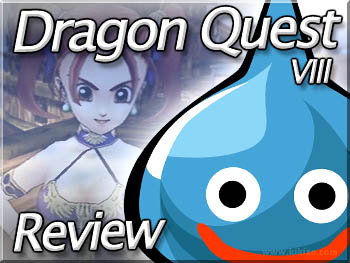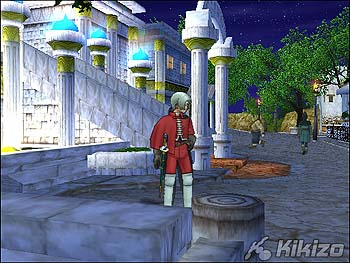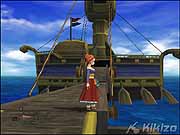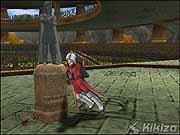Dragon Quest VIII: The Journey of the Cursed King
One of the top-rated RPGs of last year is finally arriving in Europe, and RPG fans will quickly recognize the old-school charm and legendary name.
| Version PS2 | Developer Level-5 | Publisher Square-Enix | Genre RPG |
||||
By Ben S. Dutka
Over the years, a number of role-playing franchises have withstood the test of time, delivering numerous quality titles on a relatively consistent basis. Dragon Quest, while not an international powerhouse like Final Fantasy, remains one of the most popular video game franchises in Japanese history. However, due to a lack of interest around the globe, only one Dragon Quest (VII) made it's way to the U.S. in the PSOne era, and Dragon Quest VIII is the first - and only - installment in the series in the PS2 era.

During this time, we saw five Final Fantasies, but Square-Enix has decided to allow the latest DQ blockbuster to escape their Japanese borders. Released in the U.S. on November 15 of 2005, Dragon Quest VIII immediately garnered critical acclaim and even enjoyed better-than-expected sales, possibly due to the aforementioned praise. Without any doubt, after you dive headfirst into this surprisingly massive RPG, you'll begin to notice two things- 1. Dragon Quest has retained its old-school charm, and 2. At the same time, this isn't your everyday ho-hum Japanese RPG.
It begins with the graphics, and artistic-minded gamers will instantly appreciate the vibrant cel-shaded palette, painted in broad strokes and splashed with panache. It's not supremely technical and it's not the flashiest graphical presentation on the PS2, but it ranks right up there. Each town is a pleasure to behold, the characters are well designed, and throughout your adventure, you will never grow tired of the bright and colorful world of Dragon Quest.
It's not unlike Shadow of the Colossus, where the artistry and presentation supercede sharpness and intricate detail; you won't likely see anything else like DQ VIII, and it will stay with you long after you've completed your adventure. The cel-shaded approach can be hit or miss, but Level 5 bangs this one out of the park. There could've been more attention paid to the dungeons and other enemy-infested areas, as there's too much blandness and not enough variety, but all in all, this is an impressive accomplishment.
The sound is rock solid on all fronts; effects, soundtrack, and voice-acting. The battle effects are straightforward old-school with a slight modern-day revamping, while the sweeping orchestral tracks accompany every aspect of your epic adventure. From the towns to the world map to the boss-encounter music, Dragon Quest utilizes the most classical auditory aids. The voice-acting is some of the best in recent memory, although there are a few extraordinarily annoying characters and the Hero - per tradition - is never heard. In the end, it's hardly diverse enough to be perfect, but the sound fits perfectly with the atmosphere, and that's exactly what you look for.
This series has never been known for amazingly complex combat or character advancement systems. In fact, the simplicity of the gameplay hasn't really changed in 20 years, despite several new alternations and slight enhancements in every installment. Dragon Quest VIII is no exception, but this "simplicity" isn't necessarily a bad thing, and the rest of game pays off in a big way. The combat may be old-school, but it sits among one of the hugest games ever produced.
You begin to get an idea of how large the world is almost immediately, but you never truly get a handle on the size and scope of the map for quite some time. Exploring on foot is a daunting task, as you can roam far and wide and running out of magic or items can be fatal if caught too far from town. But the developers didn't just wake up and say, "let's make this massive world that doesn't accommodate the gamer." You'll easily stockpile an item (the Chimaera Wing) that will instantly warp you to any town you previously visited, and Zoom is a common spell you'll likely learn within the first 10 hours or so.
This is in stark contrast to many Japanese-style RPGs, as most operate on more of a linear scale, so just about every RPG nut will be able to appreciate some added open-endedness. Much of your time will be spent exploring the vast landscape, trekking along with a burning desire to see what lies over the next ridge. And you will get transportation aids as well, although the first doesn't arrive until a good 20-25 hours has elapsed. Ultimately, you will have the chance to fly, and only then will you fully grasp the sheer size of the world you've been wandering through.
Your party consists of four characters: the Hero, his bumbling but powerful sidekick, Yangus, the beautiful mage Jessica, and the charismatic "ladies-man," Angelo. You have no other choices for your party. The drawbacks of this are obvious, but the benefits focus on the characters themselves: the player really gets a chance to know each character, and each one has an intriguing back-story. Furthermore, you can plan far in advance how you want to build and train your characters, creating long-term battle strategies from hour one. This, of course, leads to the combat details.
Each character gains Skill Points upon each level up, and these points are used to increase one of five abilities for each character. Four of the five are weapon-oriented and the fifth is a special ability designed for unique skills to enhance your party's capability in battle. For example, the Hero has Swords, Spears, Boomerang, Fisticuffs, and Courage. Upon reaching certain plateaus for each skill, you gain new abilities; once you dump 52 points into Sword, you will get Falcon Slash, putting 28 points into Courage will net you Holy Protection.
If you take the time to level up to Lv. 99 (and this will take a huge amount of time), there are a maximum of 350 Skill Points. Each character gets 2-11 Skill Points after each level gained, but they get them in waves, and each character is different. For example, Yangus starts off getting 7-9 skill points for his first 15 levels or so and the Hero only gets 2-4. But this switches around as you go along, and each of your four characters are very evenly balanced. It's entirely up to you which skills you train in, but it's recommended you max out a couple skills (100 points in each), allowing you to take full advantage of the best abilities in the game.
The combat is turn-based, but despite the straightforward and balanced skill system, it's just a touch too basic. While the rest of the game is loaded with large and delightfully populated towns, tons of side-quests, and hundreds of items to find, the combat is limited to attack, defend, and whatever spells and abilities you may have learned...and there aren't too many. Speed should also be a factor, but it remains highly erratic throughout; even overpowered parties will see vastly inferior enemies inexplicably moving first. Therefore, it's tough to plan for challenging encounters because you never can predict which of the party members will go first, although you can form an educated guess.
Still, the repetitiveness and simplicity of the combat isn't a major failing. It may be turn-based, but each battle is surprisingly fast and furious, and the enemies almost always pose a formidable challenge. In fact, Dragon Quest VIII ranks as one of the more demanding RPGs in a long time, requiring the player to spend some extra time exploring, completing side-quests, leveling up, and in general, just becoming more powerful for the next area. If you don't, you may find yourself tossing the controller in unbridled frustration, because in this game, one level could make all the difference...
The combat may not be deep, but the game as a whole presents a large number of extras for any gamer willing to tackle them. Undertaking them all will cause the game to clock in at a whopping 80-100 hours, and even zipping right through will require a time investment of around 60 hours. Therefore, it's not only one of the biggest but also one of the longest RPGs in recent memory. As far as depth is concerned, if you can forgive the somewhat dated combat with a decidedly small number of abilities, the game delivers on all every level.
The story revolves around the "Cursed King," as the title tells us, but to go any further would wander into the realm of the dreaded spoiler. For now, we can say the story has some serious pacing issues, with major plot points interrupted by very long periods of activity, which is not necessarily a negative thing. The only problem is that nobody is likely to be caught up in the story, as it doesn't truly get interesting until very late in the game. On the other hand, there's a great deal of charm, provided by several lovable characters and a couple slightly unpredictable twists, so it's absolutely worth the price of admission.
From combat animations to menu interaction, the presentation excels in every sense of the word. Most will marvel at the design throughout, and one wonders why we don't see this level of completeness in other RPGs; it's so well done from start to finish. The entire package benefits from the success and appeal of the glossy presentation, and it's very tough to find flaws outside of a few variety issues on the soundtrack and dungeon design fronts.
Overall, Dragon Quest VIII: Journey of the Cursed King is one of the best RPG experiences out there. Winner of multiple awards in 2005, the game shines in almost every possible category. It's quirkiness and accessibility is beautifully offset by the challenging difficulty and absorbing world, so be prepared for a very unique role-playing experience. There are a few gameplay issues, most of them centered on the combat, but there isn't a single other aspect of DQ VIII that should turn you away from one of the best RPGs of the generation.
| ||||||||||||
|





























 Satoru Iwata Video Interview - the late Nintendo president spoke with Kikizo in 2004 as 'Nintendo Revolution' loomed.
Satoru Iwata Video Interview - the late Nintendo president spoke with Kikizo in 2004 as 'Nintendo Revolution' loomed. Kaz Hirai Video Interview - the first of Kikizo's interviews with the man who went on to become global head of Sony.
Kaz Hirai Video Interview - the first of Kikizo's interviews with the man who went on to become global head of Sony. Ed Fries Video Interview - one of Xbox's founders discusses an epic journey from Excel to Xbox.
Ed Fries Video Interview - one of Xbox's founders discusses an epic journey from Excel to Xbox. Yu Suzuki, the Kikizo Interview - we spend time with one of gaming's most revered creators.
Yu Suzuki, the Kikizo Interview - we spend time with one of gaming's most revered creators. Tetris - The Making of an Icon: Alexey Pajitnov and Henk Rogers reveal the fascinating story behind Tetris
Tetris - The Making of an Icon: Alexey Pajitnov and Henk Rogers reveal the fascinating story behind Tetris Rare founders, Chris and Tim Stamper - their only interview? Genuinely 'rare' sit down with founders of the legendary studio.
Rare founders, Chris and Tim Stamper - their only interview? Genuinely 'rare' sit down with founders of the legendary studio. The History of First-Person Shooters - a retrospective, from Maze War to Modern Warfare
The History of First-Person Shooters - a retrospective, from Maze War to Modern Warfare